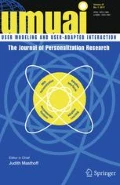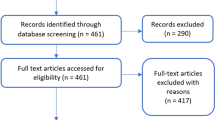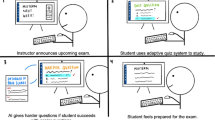Abstract
This paper presents the details of a student model that enables an open learning environment to provide tailored feedback on a learner's exploration. Open learning environments have been shown to be beneficial for learners with appropriate learning styles and characteristics, but problematic for those who are not able to explore effectively. To address this problem, we have built a student model capable of detecting when the learner is having difficulty exploring and of providing the types of assessments that the environment needs to guide and improve the learner's exploration of the available material. The model, which uses Bayesian Networks, was built using an iterative design and evaluation process. We describe the details of this process, as it was used to both define the structure of the model and to provide its initial validation.
Similar content being viewed by others
References
Albrecht, D., Zukerman, I. and Nicholson, A.: 1998, Bayesian Models for Keyhole Plan Recognition in an Adventure Game. User Modelingand User-Adapted Interaction 8, 5–47.
Aleven, V. and Koedinger, K.: 2000, Limitations of Student Control: Do Students Know When They Need Help? In: Proceedings of the Fifth International Conference on Intelligent Tutoring Systems (ITS 2000). Montreal, Canada, pp. 292–303.
Anderson, J., Corbett, A., Koedinger, K. and Pelletier, R.: 1995, Cognitive Tutors: Lessons Learned. Journal of the Learning Sciences 4(2), 167–207.
Ball, G. and Breese, J.: 1999, Modeling the Emotional State of Computer Users. In: Workshop on Attitude, Personality and Emotion in User-Adapted Interaction, at the Seventh International Conference on User Modeling. Banff, Canada.
Bunt, A.: 2001, On Creating a Student Model to Assess Effective Exploratory Behaviour in an Open Learning Environment. Master's thesis, University of British Columbia.
Bunt, A. and Conati, C.: 2002, Assessing Effective Exploration in Open Learning Environments using Bayesian Networks. In: Proceedings of ITS 2002, 6th International Conference on Intelligent Tutoring Systems. Biarritz, France, pp. 698–707.
Bunt, A., Conati, C., Huggett, M. and Muldner, K.: 2001, On Improving the Effectiveness of Open Learning Environments Through Tailored Support for Exploration. In: Proceedings of AIED 2001, 10th International Conference on Arti¢cial Intelligence in Education. San Antonio, TX, pp. 365–376.
Charniak, E. and Goldman, R.: 1993, A BayesianModel of Plan Recognition. Artificial Intelligence 64(1), 53–79.
Chi, M.: 2000, Self-Explaining Expository Texts: The Dual Processes ofGenerating Inferences and Repairing Mental Models. In: R. Glaser (ed.): Advances in Instructional Psychology. Mahwah, NJ: Lawrence Erlbaum Associates, pp. 161–238.
Conati, C., Gertner, A. and VanLehn, K.: 2002, Using Bayesian Networks to Manage Uncertainty in Student Modeling. User Modeling and User-Adaptive Interaction 12(4), 371–417.
Conati, C. and VanLehn, K.: 1996, POLA: a Student Modeling Framework for Probabilistic On-Line Assessment of Problem Solving Performance. In: Proceedings of UM-96, Fifth International Conference on User Modeling. Kailua-Kona, Hawaii, pp. 75–82.
Conati, C. and VanLehn, K.: 1997, Probabilistic Plan Recognition for Cognitive Apprenticeship. In: Proceedings of the 18th Annual Conference of the Cognitive Science Society. San Diego, CA, pp. 403–408.
Conati, C. and VanLehn, K.: 2000, Toward Computer-Based Support of Meta-Cognitive Skills: a Computational Framework to Coach Self-Explanation. International Journal of Artificial Intelligent in Education 11, pp. 389–415.
Conati, C. and VanLehn, K.: 2001, Providing Adaptive Support to the Understanding of Instructional Material. In: Proceedings of the International Conference on Intelligent User Interfaces. Santa Fe, NM, pp. 41–47.
Conati, C. and Zhou, X.: 2002, Modeling Students Emotions from Cognitive Appraisal in Educational Games. In: Proceedings of ITS 2002, 6th International Conference on Intelligent Tutoring Systems. Biarritz, France, pp. 944–954.
de Jong, T. and van Joolingen, W.: 1998, Scientific Discovery Learning With Computer Simulations of Conceptual Domains. Review of Educational Research 68(2), 179–201.
D'Souza, A., Rickel, J., Herreros, B. and Johnson, W.: 2001, An Automated Lab Instructor for Simulated Science Experiments. In: Proceedings of AIED 2001, 10th International Conference on Artificial Intelligence in Education. San Antonio, TX, pp. 65–75.
Hohl, H., Bocker, H. and Gunzenhauser, R.: 1996, Hypadapter: An Adaptive Hypertext System for Exploratory Learning and Programming. User Modeling and User-Adapted Interaction 6(2-3), 131–156.
Horvitz, E., Herckerman, D., Hovel, D. and Rommelse, R.: 1998, The Lumiere Project: Bayesian User Modeling for Inferring the Goals and Needs of Software Users. In: Proceedings of the 14th Conference on Uncertainty in Artificial Intelligence. Madison, WI, pp. 256–265.
Horvitz, E., Jacobs, A. and Hovel, D.: 1999, Attention-Sensitive Alerting. In: Proceedings of UAI'99, Conference on Uncertainty and Artificial Intelligence. Stockholm, Sweden, pp. 305–313.
Horvitz, E. and Paek, T.: 2001, Harnessing Models of Users Goals to Mediate ClariCcation Dialog in Spoken Language Systems. In: UM 2001, 8th International Conference on User Modeling. Sonthofen, Germany, pp. 3–13.
Huber, M., Durfee, E. and Wellman, M.: 1994, The Automated Mapping of Plans for Plan Recognition. In: Proceedings of the 10th Conference on Uncertainty in Artificial Intelligence. Seattle, WA, pp. 344–351.
Jameson, A.: 1996, Numerical Uncertainty Management in User and Student Modeling: An Overview of Systems and Issues. User Modelingan d User-Adapted Interaction 5(3-4), 193–251.
Jameson, A., Groβmann-Hutter, D. March, L. Rummer, R., Bohnenberger, T. and Wittig, F.: 2001, When Actions Have Consequences: Empirically Based Decision Making for Intelligent User Interfaces. Knowledge-Based Systems 14, 75–92.
Mayo, M. and Mitrovic, A.: 2000, Using a Probabilistic Student Model to Control Problem Difficulty. In: Proceedings of the Fifth International Conference on Intelligent Tutoring Systems (ITS 2000). Montreal, Canada, pp. 524–533.
Mayo, M. and Mitrovic, A.: 2001, Optimising ITS Behaviour with Bayesian Networks and Decision Theory. International Journal of Arti¢cial Intelligence in Education 12, 124–153.
Millan, E. and de-la Cruz, J. P.: 2002, A Bayesian Diagnostic Algorithm for Student Modeling and its Evaluation. User Modelinga nd User-Adapted Interaction 12(2-3), 281–330.
Mislevy, R. and Gitomer, D.: 1996, The Role of Probability-Based Inference in an Intelligent Tutoring System. User Modeling and User-Adapted Interaction 5(3-4), 253282.
Müller, C., Groβmann-Hutter, B., Jameson, A., Rummer, R. and Wittig, F.: 2001, Recognizing Time Pressure and Cognitive Load on the Basis of Speech: An Experimental Study. In: UM 2001, 8th International Conference on User Modeling. Sonthofen, Germany, pp. 24–33.
Murray, R. and VanLehn, K.: 2000, DT Tutor: A Decision-Theoretic, Dynamic Approach for Optimal Selection of Tutorial Actions. In: Proceedings of the Fifth International Conference on Intelligent Tutoring Systems (ITS 2000). Montreal, Canada, pp. 153–162.
Njoo, M. and de Jong, T.: 1993, Exploratory learning with a Computer Simulation for Control Theory: Learning Processes and Instructional Support. Journal of Research in Science Teaching 30(8), 821–844.
Pearl, J.:1988,ProbabilisticReasoninginIntelligentSystems.LosAltos,CA: MorganKaufmann.
Recker, M. M. and Pirolli, P.: 1992, Student Strategies for Learning Programming from a Computational Environment. In: Proceedings of the Second International Conference on Intelligent Tutoring Systems. Montreal, Canada, pp. 382–394.
Reiser, B., Copen, W., Ranney, M., Hamid, A. and Kimberg, D.: 1994, Cognitive and Motivational Consequences of Tutoring and Discovery Learning. Technical report, The Institute for the Learning Sciences.
Russell, S. and Norvig, P.: 1995, Artificial Intelligence: A Modern Approach. Morgan-Kaufman.
Shute, V.: 1993, A Comparison of Learning Environments: All That Glitters.... In: S. P. Lajoie and S. J. Derry (eds.): Computers as Cognitive Tools. Hillsdale, NJ: Lawrence Erlbaum Associates, pp. 47–74.
Shute, V. and Glaser, R.: 1990, A Large-Scale Evaluation of an Intelligent Discovery World: Smithtown. Interactive Learning Environments 1, 55–77.
Singley, M., Fairweather, P. and Swerling, S.: 1999, Team Tutoring Systems: Reifying Roles in Problem Solving. In: Proceedings of the Computer Support for Collaborative Learning (CSCL) Conference. Stanford, CA, pp. 538–548.
van Joolingen, W.: 1999, Cognitive Tools for Discovery Learning. International Journal of Artificial Intelligence and Education 10, 385–397.
van Joolingen, W.: 2000, Designing for Collaborative Discovery Learning. In: Proceedings of the Fifth International Conference on Intelligent Tutoring Systems (ITS 2000).Montreal, Canada, pp. 202–211.
van Joolingen, W. and de Jong, T.: 1991, Supporting Hypothesis Generation by Learners Exploring an Interactive Computer Simulation. Instructional Science 20, 389–404.
VanLehn, K.: 1988, Student Modeling. In: M. C. Polson and J. J. Richardson (eds.): Foundations of Intelligent Tutoring Systems. Hillsdale, NJ: Erlbaum, pp. 55–78.
VanLehn, K.: 1996, Conceptual and Meta Learning during Coached Problem Solving. In: Proceedings of Intelligent Tutoring Systems, 3rd International Conference (ITS'96). Montreal, Canada, pp. 29–41.
VanLehn, K. and Martin, J.: 1998, Evaluation of an Assessment System Based on Bayesian Student Modeling. International Journal of Artificial Intelligence in Education 12, 179–221.
Veermans, K., de Jong, T. and van Joolingen, W.: 2000, Promoting Self-Directed Learning in Simulation-Based Discovery Learning Environments Through Intelligent Support. Interactive Learning Environments 8(3), 229–255.
Veermans, K. and van Joolingen, W.: 1998, Using Induction to Generate Feedback in Simulation Based Discovery Learning Environments. In: Proceedings of Intelligent Tutoring Systems, 4th International Conference (ITS'98). San Antonio, TX, pp. 196–205.
Weber, G. and Brusilovsky, P.: 2001, ELM-ART: An Adaptive Versatile System for Web-Based Instruction. International Journal of Artificial Intelligence in Education 10, pp. 351–384.
Zapata-Rivera, J. and Greer, J.: 2001, Smodel Server: Student Modelling in Distributed Multi-Agent Tutoring Systems. In: Proceedings of AIED 2001, 10th International Conference on Artificial Intelligence in Education. San Antonio, TX, pp. 446–455.
Author information
Authors and Affiliations
Rights and permissions
About this article
Cite this article
Bunt, A., Conati, C. Probabilistic Student Modelling to Improve Exploratory Behaviour. User Modeling and User-Adapted Interaction 13, 269–309 (2003). https://doi.org/10.1023/A:1024733008280
Issue Date:
DOI: https://doi.org/10.1023/A:1024733008280




